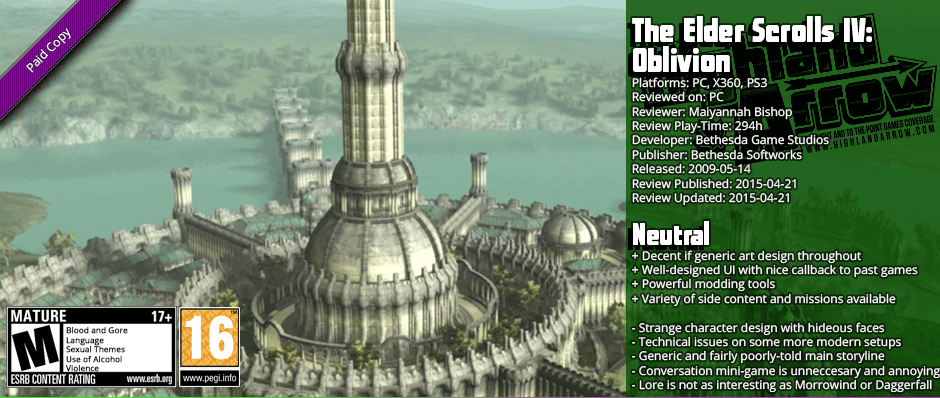

Oblivion is the fourth installment in the venerable Elder Scrolls series of role-playing games developed by Bethesda Game Studios and published by Bethesda Softworks. I've certainly made it no secret that the Elder Scrolls is one of the few series of which I am actually a fan, so if you're looking for one of those much more objective reviews, I would probably advise you to look elsewhere, but I like to think that even that is no guarantee of critical safe passage. Indeed, even Skyrim which is my favourite recent entry into the series didn't escape without it's lumps, and Oblivion is probably one of my least favourite. Not because it's some huge departure for the series, it isn't (you're thinking of Battlespire), but because it's probably the weakest of the proper main-line series of the game. It isn't bad, but it has a fair few problems. My biggest one is the story, so lets start there.
The main story that Oblivion presents is very generic
This is the crib sheet that Elder Scrolls online was playing from, let's not deny it, but whereas Elder Scrolls Online offered enough of a build-up to it and some really interesting over-world in Coldharbour to flesh it out, the titular Oblivion invasion of the Elder Scrolls IV is fairly-weak and not really capitalised on.
I probably don't need to iterate how Oblivion begins at this point as I've had people comment even on repeating myself with the Elder Scrolls Online review so I'll just lampshade that I suppose. What I will comment on is what follows I suppose, wherefore we are rapidly shepherded out of our cell by the Emperor himself, who regales us briefly by way of Sir Patrick Stewart's admittedly-quite amazing voice acting about how you, having fulfilled that epic trend of being a prisoner whom is a protagonist in an Elder Scrolls game, must be the foretold-one and therefore he is going to die very shortly, presumably to cover up the fact that they really couldn't afford such a big-name voice actor for the entire duration of the game, although that seems a rather premature worry since if you play through the main story-line exclusively through to its completion, it's probably something you can go through in one sitting, perhaps 6-8 hours depending on individual level of focus and competence, not that the game is at all hard at most points.
The thing that I execrate as much about the story here is how thin it feels, and it seems almost as if the main quest, which essentially just boils down to "assemble the team, find your powers, defeat the enemy", is something of a half-measure, a decent framework for something that could have been much greater but left stark and bare on it's own merits, and while it isn't inherently terrible I must confess, it's simply just what I said, quite barebones indeed.
Simultaneously the other large issue presented by the narrative of Oblivion is what I have decided to call the Diablo issue, in that you can describe the entire story by the actions of everyone around the player character, the entire focus of the game being the actions of the son of the Emperor to whom you act as an underpaid valet to most of the game, fetch and carry through the entire time. Where Morrowind and it's successor Skyrim gave you a role as the true prophet of the times, in Oblivion, you're merely the guy the past Emperor thought was kind of important and so you are left to feel indeed like errand boy or girl as appropriate and it feels like you're the secondary character in a genre that plays itself as power fantasy, no doubt the certain je ne sais quoi that many cite when they say they can't get on with the story of Oblivion, I'd assert.
The art design of the game is a polar mish-mash of good and bad design
Once you emerge from your inevitable prison starting point, blearily blinking away the copious amount of bloom the engine festoons upon you in its desire to be "next-gen", the first thing you're likely to notice is that the over-world that Oblivion presents is fairly-gorgeously realised. The game begins as it means to go on in this regard, with a brass-laden and epic re-rendering of Nerevar Rising that has since become the series' goto theme plaid over a sweeping fly-over view of the Imperial City in all of it's Ayelid glory, the architecture simultaneously familiar medieval jazzed up in that kind of subtle way that the industry has otherwise seemed to have forgotten of late.
That attention to a certain subtle beauty in the world's art design just makes it all the more curious that everyone you come across that's humanoid looks like someone had several rounds at their face with a briefcase or perhaps a shovel, as they look flattened and strange, quite odd really. Perhaps they used all the good artists on the world assets and the intern was the one left to struggle with the technology they licensed for the face generation and animation, and the thought that Bethesda actually paid money to license a technology that resulted in faces that look like that is probably the punch-line to the joke that they are.
A stand-out in that design is the UI
Perhaps I'm just used to the absolute cluster-fuck that was the console-UI that Skyrim and as such an actual proper user interface designed with such things as actual usability in consideration, but the user interface here is an interesting and rather great call back to the original Arena and Daggerfall games, marrying them with the paperdoll offerings of Daggerfall and Morrowind. It looks great, works well, and the only real complaint I have about it is that it could have been documented better in the actual game, especially in the Steam edition, because I can bet you that many Steam users don't even realise the manual link exists on steam.
The saving grace of the story is the dearth of side content
While the main story is not all that great or even good in my opinion that I am sure many people will tell me is entirely invalid and cause for me to take a long walk off a short cliff for, there are a variety of location-based questions and just things to explore. They are the not as deep as they could have been - a chronic complaint of mine with Oblivion as you are no doubt realising - they offer interesting if shallow bits of lore that aim to make the world feel alive, and to the game's credit they actually do manage that for the most part, even if the fact that they're all voice acted by the same one or two voice actors per gender/race combination which gives a bit of a fracture to that all-important immersion. Personally I'm not the kind to be all that bothered by the voice acting in a game perhaps having grown up in an age where voice acting in video games was pretty bad, or as a result of having survived the FMV genre's heyday.
A sandbox at the end of the day, is judged by the quality of the stuff you can fuck around with it, and much in the same way as I so often say that the shooting is ultimately what that FPSes have to do right, and indeed Oblivion has quite a few things on offer here. From alchemy to spellcrafting the classic bag of tricks is available in Oblivion, and they're all well-implemented and pretty solid, even if the utter ridiculous number of combinations of spellcrafting and enchanting from Daggerfall and Morrowind has been dialed down somewhat. Nonetheless it's here and it still as good as you remember, along with those variety of quests. And I do mean variety, by the way - the do a decent if not stellar job of variety, and it's not all of Diablo's usual "go to place and kill a bunch of dudes" - though that's not to say there isn't plenty of that.
The takeaway here is the sandbox has a little of everything, from lore-hunting quests, to dialogue, to combat, and you'll likely find something to enjoy in the sandbox. But that brings me to a more minor but still notable gripe.
Conversations in Oblivion are diminished by an minigame for the Speech skill
While I have been known at times to furiously pick at the smallest nits, I feel this one is a big enough grievance to mention, because the conversation system is always a central focus to the Elder Scrolls series, and it's been on something of a downwards slide since Daggerfall. Gone is the absolutely-inordinate amount of dialogue you could have in Daggerfall, even asking for directions to various locations, opinions on the people of the town of even middling quality. The parser-style of Morrowind seemed like a decent compromise, and it's basically gotten boiled down to five or six options per NPC when you get dialogue at all. It's not as bad as it might sound as there are some expected compromises in an age of voice acting, it feels like it is going in the opposite direction perhaps too heavily. Cutbacks here are substantive change on the feel of the game, and it sure doesn't help that you spend them staring at those really strange faces.
I've gotten side-tracked here, though, the real problem I have here is how they have tried to make an actual mechanic to the Speech system, rather than the obvious option of making it give you discounts and additional conversation options. The kudos that I might give the developers for attempting to do something different to the teeming masses of RPGs available have to be taken away for the utter annoyance of what has been deemed the "conversation pie" minigame by the community, whereby you basically try to guess at one of four "moods" to take with someone in what is only a hair away from crap shoot. There is a very middling skill to it, but the very small benefits for actually getting it right aren't worth the fair amount of effort it is to unpack the bit at play there, and that's more of a comment on how little you get from successfully doing it than anything else.
Coupled with the still-excellent Elder Scrolls Construction Kit probably in it's strongest iteration in the series, this is to me the very essence of a flawed masterpiece, though perhaps I wouldn't go as far as masterpiece except in the utterly resplendent Shivering Isles DLC, simply good. It's a good game with some flaws that will turn some people strongly off of it that's nonetheless worth a look.


